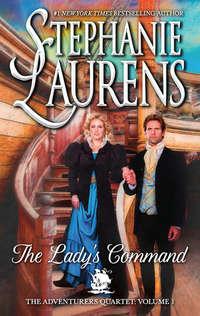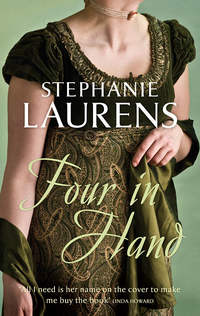
Полная версия
The Designs Of Lord Randolph Cavanaugh: #1 New York Times bestselling author Stephanie Laurens returns with an uputdownable new historical romance
Rand knew that answer was the unvarnished truth. William John was like many inventors—incapable of guile, at least when it came to inventions and inventing. In that field, they spent so much time focused unrelentingly on facts that dissembling did not come easily; indeed, most saw any form of lie as a waste of time.
Moreover, Rand could understand William John’s position. The son would need to prove himself to move out of the shadow of an established personality. Indeed, Rand’s own quest for recognition separate from the large presence of Ryder and the marquessate was what had led him to the Throgmortons’ drawing room. As much as William John, Rand needed this invention to work. He’d staked a great deal more than mere money on it; his reputation as a leader of investment syndicates was riding on this project. If he failed...his chances of attracting investors to any future syndicate would dim considerably.
While not strictly correct, William John’s approach to the situation was entirely understandable, at least to Rand.
Slowly, he nodded. “Very well. We now know where we stand.” His personal strength lay in evaluating options and finding the best way out of any difficulty. He straightened in his chair. “What we need to do next is to define the problems facing us.”
Still reeling from the impact of successive revelations, Felicia felt that defining their problems was a very good idea. That both her father and her brother had been so duplicitous, at least in her eyes, deeply troubled her; the scope of what had been going on under her nose while she’d remained entirely unaware had shaken her to her foundations. She’d always believed she had been the one steering the ship of their household, while in reality, she hadn’t even known in which direction they’d been headed.
She focused on Lord Cavanaugh as, with a slight frown—one of concentration—drawing down his dark brows, he stated, “With only three weeks to go before the exhibition, we cannot withdraw from the event—not without sustaining considerable damage to all our reputations. A withdrawal at this stage would signal to everyone that the invention had failed. That, of course, is the one result we would all prefer to avoid.”
His lordship’s gaze rested on William John. Felicia had already noticed that Cavanaugh had eyes of the warmest mid brown she’d ever seen—like heated caramel or melted toffee.
“I believe,” he continued, “that in the circumstances, we must hold to our goal of getting the steam engine working per your father’s plans and successfully unveil the Throgmorton Steam-Powered Horseless Carriage at the exhibition. If we fail to do so”—he shot Felicia a glance, then returned his gaze to William John—“William John’s future as an inventor will be ruined before he truly starts. You will become an investment pariah”—again, Cavanaugh glanced Felicia’s way—“and as I understand it, you don’t have the capital to undertake further inventing of this nature on your own.”
William John grimaced. “All you say is true. That’s why I’ve forged on so doggedly—I have to get the engine working perfectly and present it at the exhibition.”
Cavanaugh inclined his head. “But there’s more at stake than just your future.”
Felicia nearly laughed—humorlessly—at the surprise that showed in William John’s face. As she well knew, inventors never thought beyond the invention. Beyond their work.
She felt Cavanaugh’s gaze touch her face again, then he said, “Forgive me if I mistook the implications of your earlier exchange, but it seemed to me that absent the funds advanced to support this latest invention, this household would not be solvent.”
Felicia met Cavanaugh’s eyes and grimly nodded. “No need to apologize—you’re quite correct.” For an instant, she allowed herself to hold to the steady warmth in his gaze while she rapidly reviewed the household accounts. “Put simply”—she looked at William John—“if this latest invention isn’t a success, the family will be financially ruined. We do not have sufficient income from other sources to continue the upkeep of the Hall.” She allowed her gaze to weigh on her brother. “We would be forced to sell up.”
William John flinched. “Really?” He met her eyes as if willing her to say she was joking.
“Yes.” It was past time he faced the truth of the dire straits to which inventing and inventions had driven them.
After a second, Cavanaugh went on, “And, sadly, the repercussions do not end there.”
Felicia looked at him, puzzled as to what else might be at stake, but his gaze seemed to have turned inward.
“While this project is not my first as the head of a syndicate, it is the most prominent of my investment projects to date. It’s the project my coterie of investors are most interested in seeing succeed. If we”—he refocused on William John, then included Felicia with his gaze—“do not deliver on the promise of that investment, do not live up to the assurances of success I gave, then my carefully nurtured reputation as an investment syndicate leader will be...severely compromised.”
Only now that he’d considered the possibility—if not likelihood—of the Throgmorton steam engine failing had Rand realized just how much he’d staked on its success. “Of course, on top of that, my own funds will take a sizeable hit.” But that was the least of his worries.
Silence fell—a moment of staring into the abyss as they all dwelled on the consequences of failure.
Perhaps unsurprisingly, it was William John who first stirred and said, “Well, we’ll just have to make sure the engine works as advertised.”
Rand took in the young inventor’s unwavering determination and had to wonder...
Regardless, there seemed no other way forward, yet long acquaintance with the species had taught Rand that where time was a factor, even when deadlines loomed, inventors could not be trusted to keep their focus.
He felt as if the circumstances were forming up around him and all-but-physically herding him into taking on a role he never had before. Into taking a large step beyond the comfort of the arenas in which he was knowledgeable and embarking down a path of unknown risks and unforeseeable challenges.
Nevertheless...
He glanced again at Miss Throgmorton, then looked at William John. “I agree. At this point, I can’t see any alternative way forward—not for any of us—other than to persevere, get the engine working, and present it successfully at the exhibition.”
William John nodded, his expression resolved and sure.
Rand glanced at Miss Throgmorton. If they were to have any hope of succeeding in time, they would need her support as well.
Felicia met and returned Cavanaugh’s gaze. Only when he faintly arched his brows did she realize he was waiting for—asking for—her agreement. She blinked, then cleared her throat and said, “I agree. There seems no other viable way to proceed.” Until the last moments, she hadn’t realized just how dire—how absolute and inevitable—the consequences of failure would be.
Only now did she fully comprehend what was hanging over their heads.
Yet another revelation she would need time to fully assimilate.
Cavanaugh nodded. “So we three are resolved.”
Rand shifted his gaze to William John. “Given how much is riding on the outcome, I’ll remain and assist you as required, at least until you get the engine going. I can’t work on the mechanics as you do, but I am very good at managing time and resources, and we’ll need everything running smoothly if we’re to succeed in attaining our mutual goal.”
Far from being put out by the thought of having someone looking over his shoulder, William John’s face lit with eagerness. “I’ll be delighted to explain the engine to you.” He paused, his mind clearly going to the invention, then he grimaced and refocused on Rand. “The boiler will be too hot for us to dismantle it today, but I can show you the workshop and explain what does what and where our current problems lie—if you’d like that?”
Rand nodded and pushed out of the armchair. “That sounds an excellent place to start.”
He glanced at Miss Throgmorton. A faint frown on her face, she was sitting with her hands clasped in her lap, staring at the low table. As if feeling his gaze, she looked up, and he caught her green eyes. He inclined his head. “Until later, Miss Throgmorton.”
She dipped her head in reply. “Lord Cavanaugh. I’ll have a room prepared for you.” To her brother, she added, “I’ll see you both at dinner.”
William John waved vaguely and headed for the door.
Rand followed and wondered just what he’d let himself in for.
CHAPTER 2
Rand followed William John into the front hall. The younger man led the way to the wooden door Rand had earlier noted.
Someone had shut the door, no doubt against the still-definite smell, but apparently oblivious, William John lifted the latch and started down the stairs. “Our laboratory-workshop takes up most of the lower level of the house. My father set it up when he was a young man, and it’s been in use ever since.”
Descending the spiral stairs on William John’s heels, Rand asked, “How do you get heavy machinery into the workshop?” The stairway was too narrow to get even a smallish engine down.
“Ah. As I said, it’s a lower level of the house—not a cellar. The land behind the house is lower than in the front, so we have a pair of double doors that open to a paved courtyard at the rear of the house—we just roll the engines in and out.”
They rounded another curve, and William John halted. “Damn!”
Rand stopped two steps up and looked over William John’s head at the drifting murk blanketing the enclosed space below them. A noxious stench, sulfurous and metallic, rose from the cloud. The miasma wafted, veiling benches and the large bulk of an engine, plus any number of other contraptions dotted about the wide, stone-walled chamber.
“I forgot the door was shut.” William John clapped a hand over his nose and mouth and plunged into the fug. He rushed across the room to a pair of large wooden doors, fumbled with the latch, then pushed the doors wide.
The cloud of heavy gases shifted, then settled again. William John stood on the flagstones outside and frantically waved his arms, attempting to encourage fresh air to flow in, but his efforts were largely ineffectual.
He dragged in a breath, then rushed back through the haze to the stairs. Climbing to where Rand had waited, William John sighed. He looked down and across the room. “Perhaps we’d better leave any inspection until tomorrow.”
Rand grunted in agreement. “I doubt inhaling tainted steam will do either of us any good.” He turned and led the way back up the stairs.
William John followed; even his footfalls sounded disappointed. “My man, Corby—well, he used to be Papa’s, so he’s accustomed to dealing with explosions. He’ll see to getting the place tidied up first thing tomorrow.”
Rand merely nodded. He emerged into the front hall to find the butler hovering.
At the sight of Rand, the butler—middle-aged, tallish, of average build, with thinning brown hair and a stately manner—came to attention and bowed. “Lord Cavanaugh. Welcome to Throgmorton Hall.” The butler straightened. “I regret we were somewhat distracted when you arrived. My name is Johnson. Should you require anything during your stay, please ring and we will endeavor to meet your needs. Miss Throgmorton asked for a room to be prepared. If it’s convenient, I can show you to your room now.”
Rand realized he felt as if, in driving up the Throgmorton Hall drive, he’d stepped into some strange and unpredictable world; a butler who, despite appearing strictly conventional, referred to dealing with an in-house explosion as being “somewhat distracted” seemed all of a piece. “Thank you.” Taking a few moments to reassess the situation appealed to his naturally cautious self. “I would appreciate shedding the dust of my journey.”
Johnson bowed again. “Indeed, my lord. I’ll have a maid bring up some water. If you’ll follow me?”
Rand turned to William John; the younger man was standing, frowning at the floor. “I expect we’ll meet at dinner.”
“What?” William John blinked owlishly, refocused on Rand, then his face cleared. “Oh yes. I’ll look forward to it.”
Rand resisted the urge to shake his head, nodded instead, and followed Johnson up the stairs. One thing he’d already ascertained: William John was as vague and as given to fits of absentmindedness as his father had been.
The room the butler led Rand to was a pleasant bedchamber located in the northwest corner of the first floor. Comfortably furnished, with upholstery, curtains, and bedspread in a striped fabric that was neither masculine nor feminine, the room felt airy and was blessedly uncluttered. The bed was a half tester, wide and well supplied with pillows. Two side tables flanking the bed, an armoire, a tallboy, a desk with a straight-backed chair set beneath one window, plus a small dressing table tucked into a corner with a stool before it, rounded out the furniture.
Two windows looked out over the grounds, one facing north, the other west. Late-afternoon light streamed into the room through the west-facing window. Noting that his bags had already been unpacked and his brushes and shaving implements laid ready on the dresser, Rand dismissed the hovering Johnson, then crossed to look out of the west window. As he’d expected, that window afforded an excellent view of the drive leading to the forecourt, plus the woodland beyond, and, farther to the north, the shrubbery.
After surveying the scene, he moved to the other window. From there, he could see the eastern edge of the shrubbery and the stable and stable yard more or less directly ahead. Farther to the east lay a structured garden. From the profusion of blooms and their sizes and colors, Rand suspected it was a rose garden.
As he watched, a lady walked purposefully from the rear of the house toward the arched entrance of the garden, a basket swinging from her hand. Despite the distance, Rand recognized Miss Throgmorton.
He’d been acquainted with William Throgmorton for over four years. Rand had known William had a son, of whom he was quite proud.
The old inventor had never mentioned a daughter.
Rand watched as Miss Throgmorton halted in the middle of the garden, dropped her basket, then set about attacking the tall bushes with what, from her rather vicious movements, he assumed was a pair of shears.
He focused on her, his senses drawing in to the point he didn’t really see anything around her. Just her, her lithe figure topped by her flaming red-gold hair, lit to a fiery radiance by the warm rays of the westering sun. Regardless of the distance, he sensed the vitality that animated her; for some reason, she all but shone in his sight, a beacon for his senses.
A magnetic, compelling, distracting beacon.
How long he stood and stared he couldn’t have said; footsteps approaching along the corridor had him shaking off the compulsion and turning to face the door.
After the briefest of taps, the door opened, and Shields—Rand’s groom, who, in a pinch, also served as his gentleman’s gentleman—came in.
“Ah—there you are.” Bearing an ewer, Shields nudged the door closed, then advanced to set the ewer on the dresser. “I’ve unpacked, and I brushed that blue coat of yours for the evening. If that’ll suit?”
Rand nodded. “Yes, that’s fine.”
“Are we staying for a while?” Shields asked.
Rand frowned. “A few days at least.”
Shields grunted. “Just as well we were on our way to Raventhorne, then. At least we’ve both got clothes enough for a stay.”
Putting his back to the view, Rand leant back against the windowsill. “What are your thoughts on the household here?”
“Despite what we saw when we drove up, it’s a well-run house. Calm and well-ordered, even if a mite eccentric. The staff are longtimers, all of them—and if they’re not that old, then their parents were here before them. Very settled, they are, and... I suppose you’d say they’re content.”
“The explosions don’t trouble them?”
“Seems they’re used to them—and apparently, there’s never been anyone hurt. Just lots of noise and nasty smoke.”
Rand nodded. A well-run household and contented staff were excellent indicators of the qualities of a house’s master. Or mistress, as the case might be.
He straightened from the sill and turned to look out of the window again.
“Country hours here, so dinner’s at six.” Shields retreated toward the door. “Do you need me for anything else?”
Rand shook his head. “Not today.” His gaze flicked to the stable. “How are the horses?” He’d purchased the pair only two months ago; they were young and still distinctly flighty.
“They didn’t approve of the bang and the smell, but the stable’s well away from the house, and they settled happily enough.”
“Good.” Rand paused, then said, “I doubt I’ll need the horses for the next few days at least. Other than keeping an eye on them, I won’t need you for much, but let me know if you see or hear anything that strikes you as odd.”
“Aye. I’ll do that. I’m off for my tea, then.”
Rand heard the door open and shut. His gaze had already found and refocused on Miss Throgmorton.
She was still attacking the roses.
Rand wavered, prodded by an impulse to go down and speak with her. About what, he wasn’t all that clear. Judging by the energy with which she was clipping, she was still distinctly exercised over what his arrival had revealed.
She’d had no inkling of Rand’s or the syndicate’s existence. More, Rand sensed her antipathy toward inventing—an attitude that had reached him perfectly clearly during their meeting in the drawing room—had a deeper source than mere female disapproval of such endeavors.
Yet her support would be vital in keeping her brother’s nose to the grindstone, and they all needed William John to finish the invention within the next three weeks.
Rand wasn’t sure how much he could actively help William John—that remained to be seen—but at the very least, he could ride rein on the younger man and ensure he remained focused on solving the issues bedeviling his father’s machine. William John had already shown strong signs of the absentminded mental meandering Rand had observed in many other inventors.
In his experience, time was the one dimension to which inventors rarely paid heed.
Yet in this case, time was very definitely of critical importance.
Rand refocused on Miss Throgmorton.
He drew out his fob watch and checked the face, then tucked the watch into his pocket and headed for the door.
He had time for a stroll before dinner.
* * *
In the rose garden, Felicia deadheaded roses with a vengeance. With her left hand, she gripped the next rose hip; with her right hand, she wielded the shears. Snip! She dropped the clipped hip into her basket and reached for the next.
She’d hoped the activity would allow her to release some of the emotions pent up inside her. And, in truth, simply being out of the house and breathing fresher air had eased the volcanic anger, fueled by hurt, that had welled within her on learning of her father’s and brother’s subterfuge.
Snip.
Her father was dead; she couldn’t berate him. As for her brother...while she could berate him, she and the household—not to mention the too-handsome-for-his-own-good Lord Cavanaugh and his syndicated investors—needed William John to keep his mind on his work. Berating him wouldn’t help.
Snip.
Besides, she knew her brother well enough to know he would feel no real remorse; encouraging her to believe that the funds she’d been drawing on to keep the household running had been royalties from previous inventions would have seemed to her father and William John to be the easiest path.
They wouldn’t have wanted her to worry over using money received from others for an invention they hadn’t yet got to work.
Their sleight of mind still hurt.
And she was now quite worried enough, and in that, she wasn’t alone. Even William John was uncertain. Unsure.
He’d been growing steadily more nervous over recent weeks—more nervous than she’d ever known him. She’d wondered why. Now, she knew.
This time, her father and brother had embarked on a gamble that might not pay off.
She nudged the basket along with her foot and reached for the next dead rose.
Unlike previous projects, where she’d insisted they worked only with capital they already possessed and also left untouched a cushion of funds on which the household could fall back on should the project fail, this time, there was no cushion. No funds to fall back on.
No way to keep going.
Snip.
This time, if the invention failed, they would have to sell the Hall and let the staff go. There’d been Throgmortons at the Hall for generations; everyone would be devastated. The loss of their home would hurt William John even more; without his laboratory-workshop, he would be rudderless. As for her...she had no idea what such a future would hold for her, other than that it would be bleak. She’d had her Season in London and hadn’t taken—and she hadn’t taken to life in the capital, either; it had been far too superficial for her taste. Now, at the age of twenty-four, the best she could hope for was a life as a paid companion or as an unpaid poor relative in one of her distant cousins’ households.
If she’d been a different sort of female, she might have given way to despair, but she didn’t have time for any such indulgence. As far as she could tell, there was one and only one way to avoid the abyss that had opened up before them—William John had to get the dratted modified steam engine to work.
Snip.
If she wanted to save the household, the Hall, William John, and herself, she needed to do all she could to keep her brother’s mind focused on that task and ensure that all possible burdens were lifted from his shoulders.
William John was a year older than she was, but it had long been she who managed everything around him.
A distant step on the gravel path circling the house had her raising her gaze. Lord Cavanaugh—he who, from her year’s experience of London society, she had instantly recognized as belonging to the too-handsome-for-his-own-good brigade—was crossing the lawn. He wasn’t out strolling; there was nothing idle about his stride. He’d seen her and, apparently, was intent on speaking with her.
While ostensibly clipping another dead rose, she watched him approach. Over six feet tall, with wide shoulders, a well-muscled chest, narrow hips, and long, strong legs, he cut a powerful figure, well-proportioned and rangy. Also distinctly mature; she judged him to be in his early thirties. He was still wearing the clothes he’d arrived in—a fashionably cut coat over a fine linen shirt, a neatly tied ivory cravat, tightly fitting buff breeches, and top boots. The subdued style, exquisite cut, and expensive fabrics marked him as a gentleman of the ton’s upper echelons, yet it was his features that had prompted her to give him the label she had; his dark, walnut-brown hair, the thick locks fashionably trimmed, framed a face of cool calculation tinged with the autocratic arrogance often found in those of the higher nobility.
He was a marquess’s son, after all.
The long planes of his face were spare, even austere, with sharp cheekbones on either side of a patrician nose, and firm, chiseled lips above a squarish chin. Straight dark-brown eyebrows and surprisingly thick dark lashes set off those eyes of molten caramel that she’d already discovered were unwarrantedly distracting.
Those eyes were currently trained on her. Trapped under his gaze, to her irritation, she felt her lungs contract until breathlessness threatened. And the closer he came, the worse the effect grew.
Her father’s cousin, Flora, who lived at the Hall and was nominally Felicia’s chaperon, had already been won over by Cavanaugh when, in the immediate aftermath of the recent explosion, he’d attentively assisted her to the bench by the front steps.











